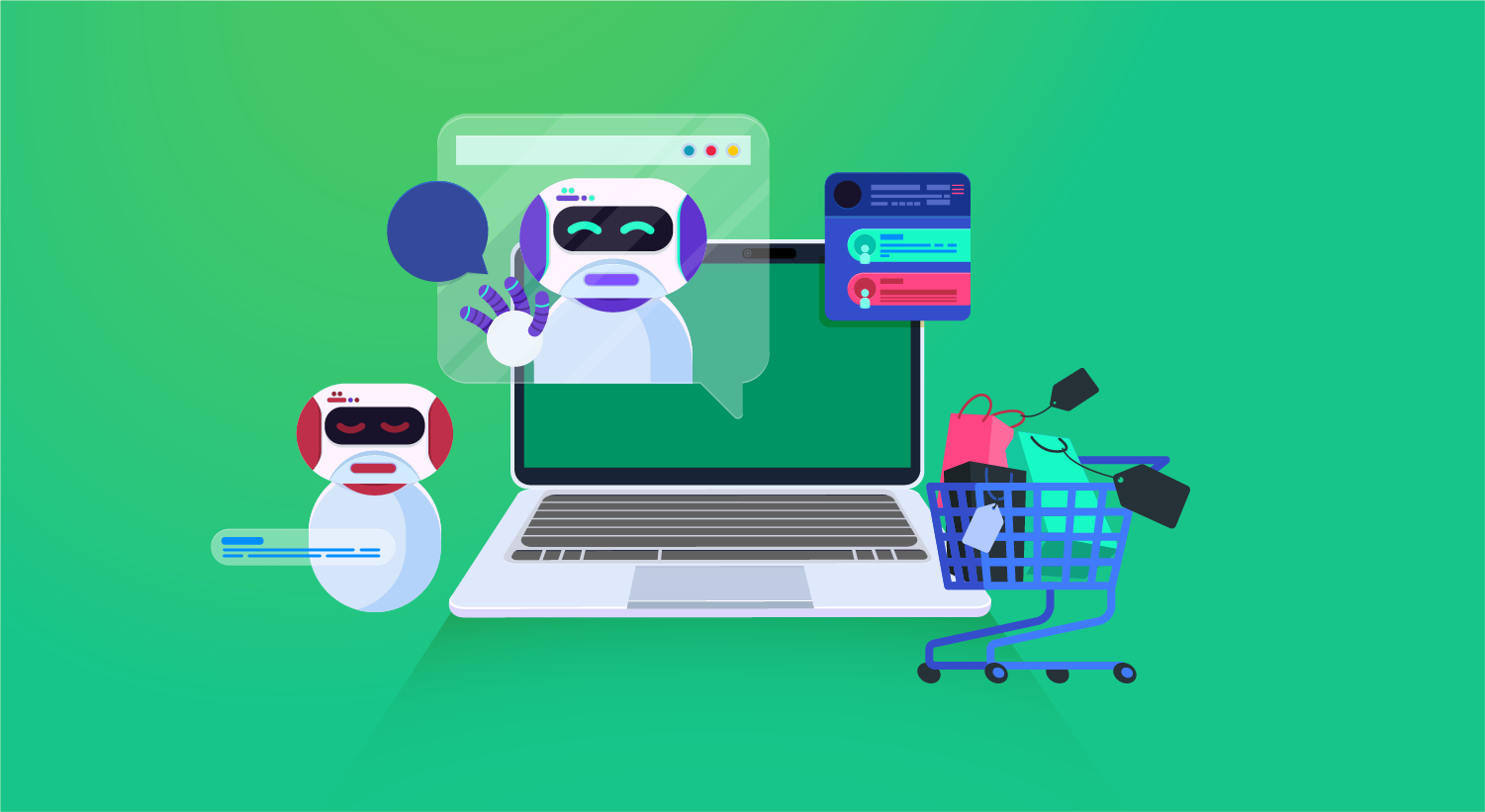As we progress through 2024, the e-commerce landscape is evolving rapidly, with AI chatbots leading the charge. These advanced virtual assistants, including no-code AI chatbots, are changing how online businesses interact with customers, streamline operations, and drive sales. Let’s explore the impact of AI bots on e-commerce this year.
The Evolution of AI Chatbots
In 2024, AI chatbots have advanced significantly from their earlier, basic versions. Today’s chatbots, such as no-code AI chatbots, use sophisticated technology to understand and respond to customer needs in a more human-like manner.
Key Features of Modern Chatbots:
- Multilingual Support: AI chatbots now speak multiple languages, allowing businesses to reach a global audience.
- Sentiment Analysis: AI bots can recognize customer emotions and adjust their responses for a more empathetic interaction.
- Personalization: AI chatbots use customer data to provide tailored recommendations and shopping experiences.
- Visual Recognition: Many AI chatbots can understand and process images, enabling product searches through pictures.
- Voice Integration: AI bots handle voice commands, accommodating the growing trend of voice-based shopping.
Enhancing Customer Experience
AI chatbots have greatly improved customer experiences in several ways:
- 24/7 Support: AI chatbots are available around the clock to answer questions and resolve issues, meeting the expectations of today’s online shoppers.
- Personalized Assistance: By analyzing customer data, AI bots offer customized product suggestions and advice, making shopping more enjoyable.
- Efficient Customer Service: AI chatbots manage a range of tasks such as tracking orders and processing returns, which speeds up service and allows human agents to handle more complex issues.
- Guided Shopping: AI chatbots can assist customers throughout the shopping journey, from finding products to completing purchases.
Boosting Sales and Conversions
AI chatbots also help increase sales and conversion rates:
- Reducing Cart Abandonment: AI bots can intervene when customers are about to leave their shopping carts, providing support or incentives to complete the purchase.
- Upselling and Cross-selling: By analyzing customer behavior, AI chatbots suggest related or higher-end products, raising average order values.
- Targeted Promotions: AI bots deliver personalized offers and discounts based on individual shopping patterns.
- Streamlined Purchases: AI chatbots can handle transactions directly within the chat interface, simplifying the buying process.

Improving Operational Efficiency
Beyond customer interactions, AI chatbots enhance various backend operations:
- Inventory Management: AI chatbots monitor stock levels and forecast demand, helping businesses keep inventory in check.
- Data Analysis: AI bots collect and analyze customer data, providing insights that help refine strategies and make informed decisions.
- Automated Order Processing: Many AI chatbots can process orders, changes, and cancellations automatically, improving efficiency.
- Market Expansion: Multilingual capabilities allow businesses to enter new markets with ease.

Challenges and Considerations
Despite their benefits, AI chatbots face some challenges:
- Privacy and Security: Ensuring customer data is protected is essential as AI chatbots handle sensitive information.
- Balancing Automation and Human Interaction: Finding the right balance between automated responses and human empathy is crucial.
- Ongoing Improvement: Regular updates and training are needed to keep AI chatbots effective and relevant.
- System Integration: Integrating AI chatbots with existing platforms can be complex.
- Managing Expectations: As AI chatbots become more advanced, managing what they can and cannot do is important to prevent customer frustration.
The Power of AI in E-commerce Examples
Look no further than some of today’s e-commerce giants to see AI in action:
| Retailer | AI Feature | Benefit for Customer | Benefit for Business |
| Netflix | Recommendation Engine | Personalized movie and show suggestions | Increased viewer engagement, reduced subscriber churn |
| Amazon | Product Recommendations | Discover relevant products based on preferences | Increased sales conversion, enhanced customer retention |
| Sephora | Virtual Artist App | Try on makeup virtually before purchase | Reduced return rates, personalized beauty experiences |
AI: Shaping the Future of E-commerce
The e-commerce landscape is undergoing a metamorphosis driven by the transformative power of Artificial Intelligence. Gone are the days of generic online storefronts; AI is ushering in an era of hyper-personalized experiences, revolutionizing the way we shop online.
AI-powered recommendation engines, like the ones used by Netflix and Amazon, analyze your past behavior and preferences to curate product suggestions that feel eerily relevant. No more wading through endless product pages; AI anticipates your needs, presenting you with items that pique your interest and spark that “must-have” feeling.
The Future of AI Chatbots in E-Commerce
Looking ahead, AI chatbots are expected to play an even more central role in e-commerce:
- Advanced Predictions: AI bots will improve at anticipating customer needs and preferences.
- Enhanced Visual and Voice Features: We may see better integration of visual and voice recognition for an even smoother shopping experience.
- Emotional Intelligence: Future AI chatbots might develop greater emotional understanding for more nuanced interactions.
- Augmented Reality: AI chatbots could guide users through virtual try-ons and other AR experiences.
- Blockchain: Some AI chatbots might use blockchain for greater transparency and security in transactions.

Conclusion
In 2024, AI chatbots are integral to the e-commerce landscape, improving customer service, personalizing experiences, boosting sales, and enhancing operations. For online retailers, adopting and optimizing AI chatbot technology, including no-code AI chatbots, is becoming essential to stay competitive. Embracing these tools will help businesses meet customer expectations and thrive in the evolving digital market.
FAQ
Q: How are AI chatbots improving customer service in e-commerce?
A: AI chatbots are enhancing customer service by providing 24/7 support, offering personalized assistance, handling routine queries quickly, and freeing up human agents to deal with more complex issues. They’re also reducing response times and improving consistency in customer interactions.
Q:Can AI chatbots really increase sales in online stores?
A: Yes, AI chatbots can increase sales by reducing cart abandonment, offering personalized product recommendations, upselling and cross-selling, and simplifying the purchasing process. They can also provide timely promotions and discounts to encourage purchases.
Q: Are AI chatbots replacing human customer service agents?
A: While AI chatbots are handling an increasing number of customer interactions, they’re not entirely replacing human agents. Instead, they’re complementing human efforts by handling routine tasks and allowing human agents to focus on more complex, high-value interactions that require empathy and advanced problem-solving skills.
Q: How do AI chatbots handle multiple languages in e-commerce?
A: Modern AI chatbots use advanced natural language processing to communicate fluently in multiple languages. This allows e-commerce businesses to provide support and shopping assistance to customers worldwide, facilitating global market expansion.
Q: What are the main challenges of implementing AI chatbots in e-commerce?
A: Key challenges include ensuring data privacy and security, integrating chatbots with existing e-commerce systems, maintaining a balance between automation and human touch, and continuously updating and improving chatbot performance to meet evolving customer expectations.
Q: How are AI chatbots likely to evolve in the near future for e-commerce?
A: In the near future, we can expect AI chatbots to have more advanced predictive capabilities, better emotional intelligence, and improved integration with technologies like augmented reality and blockchain. They may also become more adept at visual and voice commerce, further enhancing the online shopping experience.


Leave a Reply